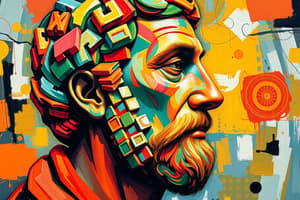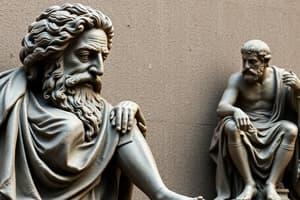Podcast
Questions and Answers
What does Aristotle identify as the function of a human being?
What does Aristotle identify as the function of a human being?
- To feel emotions deeply
- To accumulate knowledge
- To enjoy life through pleasure
- To reason and act on reasons (correct)
According to Aristotle, what is necessary for something to be considered good?
According to Aristotle, what is necessary for something to be considered good?
- It is aesthetically pleasing
- It fulfills its function or telos (correct)
- It lasts a long time
- It is popular among the masses
What analogy does Aristotle use to explain the function of a human being?
What analogy does Aristotle use to explain the function of a human being?
- The function of a book conveying information
- The function of a car and its components (correct)
- The function of a tree producing oxygen
- The function of a clock telling time
What is the telos of a human being, according to Aristotle?
What is the telos of a human being, according to Aristotle?
What philosophical stance may make Aristotle's notion of a true function seem odd to some?
What philosophical stance may make Aristotle's notion of a true function seem odd to some?
In Aristotle's view, how do we achieve the good life?
In Aristotle's view, how do we achieve the good life?
What does Aristotle imply about the components of human existence?
What does Aristotle imply about the components of human existence?
Which feature, according to Aristotle, differentiates humans from other animals?
Which feature, according to Aristotle, differentiates humans from other animals?
What does the Golden Mean suggest about virtuous actions?
What does the Golden Mean suggest about virtuous actions?
How does Aristotle view the assessment of a person's character?
How does Aristotle view the assessment of a person's character?
Which of the following pairs contrasts a vice of deficiency with its corresponding virtue and vice of excess?
Which of the following pairs contrasts a vice of deficiency with its corresponding virtue and vice of excess?
According to Aristotle, what is the nature of virtues?
According to Aristotle, what is the nature of virtues?
What essence does the quote attributed to Will Durrant convey about excellence?
What essence does the quote attributed to Will Durrant convey about excellence?
When is an action likely to be deemed rash according to the understanding of virtue?
When is an action likely to be deemed rash according to the understanding of virtue?
What is the primary aspect that distinguishes a virtuous action from a vicious one?
What is the primary aspect that distinguishes a virtuous action from a vicious one?
What does Aristotle suggest is necessary for developing virtuous character traits?
What does Aristotle suggest is necessary for developing virtuous character traits?
What does Aristotle imply about someone who acts generously only once?
What does Aristotle imply about someone who acts generously only once?
What does the concept of practical wisdom (phronesis) enable a person to do?
What does the concept of practical wisdom (phronesis) enable a person to do?
According to Aristotle, which of the following is true about single acts of virtue?
According to Aristotle, which of the following is true about single acts of virtue?
What role does the Golden Mean play in Aristotle's Virtue Ethics?
What role does the Golden Mean play in Aristotle's Virtue Ethics?
Why might practical wisdom be considered the most important virtuous disposition according to Aristotle?
Why might practical wisdom be considered the most important virtuous disposition according to Aristotle?
What is a misconception about becoming virtuous that Aristotle addresses?
What is a misconception about becoming virtuous that Aristotle addresses?
How does Aristotle relate skill development to virtuous character?
How does Aristotle relate skill development to virtuous character?
Which of the following best describes the outcome of developing practical wisdom?
Which of the following best describes the outcome of developing practical wisdom?
What is described as the way individuals can learn about virtue?
What is described as the way individuals can learn about virtue?
How does Aristotle classify actions in terms of moral responsibility?
How does Aristotle classify actions in terms of moral responsibility?
Which factor can make an action involuntary according to Aristotle?
Which factor can make an action involuntary according to Aristotle?
What distinguishes a voluntary action from an involuntary action?
What distinguishes a voluntary action from an involuntary action?
What role do 'virtue apprentices' play in developing practical wisdom?
What role do 'virtue apprentices' play in developing practical wisdom?
Which scenario best represents an involuntary action?
Which scenario best represents an involuntary action?
In the context of moral responsibility, which statement about voluntary actions is true?
In the context of moral responsibility, which statement about voluntary actions is true?
What does the example of Reuben in the car illustrate?
What does the example of Reuben in the car illustrate?
What factors can lead to an action being classified as involuntary according to Aristotle?
What factors can lead to an action being classified as involuntary according to Aristotle?
In the scenario with David, what made his action involuntary?
In the scenario with David, what made his action involuntary?
Why is Rhys not held morally responsible for the distress he caused at the concert?
Why is Rhys not held morally responsible for the distress he caused at the concert?
How does Aristotle differentiate between ignorance that leads to involuntary actions and other forms of ignorance?
How does Aristotle differentiate between ignorance that leads to involuntary actions and other forms of ignorance?
What type of ignorance led to Laurence's action of climbing a traffic light?
What type of ignorance led to Laurence's action of climbing a traffic light?
What is the primary reason Aristotle would argue that David is not morally responsible for his action?
What is the primary reason Aristotle would argue that David is not morally responsible for his action?
What is a characteristic of actions from ignorance that Aristotle would agree with?
What is a characteristic of actions from ignorance that Aristotle would agree with?
What is the outcome of Rhys's ignorance regarding his friend's feelings towards Barry Manilow?
What is the outcome of Rhys's ignorance regarding his friend's feelings towards Barry Manilow?
Flashcards are hidden until you start studying
Study Notes
Aristotle's Function Argument
- All objects possess a purpose or telos.
- An object is deemed good when it effectively fulfills its telos.
- For human beings, the telos is the capacity to reason.
- Goodness for humans is found in acting in accordance with reason.
- Unique trait that differentiates humans from animals is the ability to reason and act on reasoning.
- Just as every part of an object has a function, so too does humanity as a whole have a distinct purpose.
Aristotelian Goodness and Virtue
- The good life is achieved by acting in line with one's telos.
- Virtues are characterized as dispositional responses that define individual character.
- The Golden Mean suggests that virtue is not about moderation but finding balance between excess and deficiency.
- Virtues need to be viewed in situational contexts, acknowledging varying responses in different circumstances.
Virtuous Situations
- Social conduct ranges from cantankerousness (deficiency) to self-serving flattery (excess), with friendliness as the mean.
- Conversation varies from boorishness (deficiency) to buffoonery (excess), with wittiness as the mean.
- Giving money is considered stingy (deficiency) at one end and profligacy (excess) at the other, with generosity marking the virtuous mean.
Character Development and Habituation
- Virtue is a habit formed over time; excellence is not obtained overnight.
- Practicing virtues requires consistent actions, reinforcing the idea that becoming virtuous is a lifelong commitment.
- Appropriate responses in typical situations stem from developed skills rather than mere reaction.
Practical Wisdom (Phronesis)
- Practical wisdom is essential for discernment in achieving virtue in various situations.
- It helps individuals determine what constitutes courageous or generous behavior.
- Learning from virtuous individuals enhances one's practical wisdom and virtue.
Voluntary and Involuntary Actions
- Actions are categorized as voluntary (freely chosen) or involuntary (not freely chosen).
- Morally responsible actions are typically those that are voluntary.
- An action is involuntary if influenced by external force or ignorance.
Examples of Involuntary Actions
- Physical Force: A passenger forces a driver to turn the steering wheel, making the driver involuntarily responsible for the resulting accident.
- Psychological Force: Under threat of violence, an individual may act in a way that is considered involuntary due to coercive pressure.
- Action from Ignorance: An individual inadvertently offends someone due to unawareness of changing circumstances; they bear no moral responsibility in such cases.
Important Distinctions
- Not all ignorance leads to involuntary action; genuine ignorance must be clearly defined to establish moral responsibility.
- Actions motivated by temporary ignorance, such as those under the influence of substances, do not exempt one from moral responsibility.
Studying That Suits You
Use AI to generate personalized quizzes and flashcards to suit your learning preferences.




